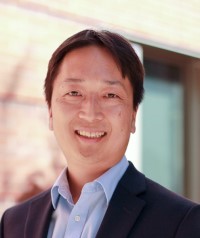Using Artificial Intelligence To Improve Breast Cancer Screening and Enhance Workflow
William Hsu, Ph.D.
Associate Professor of Radiological Sciences
University of California Los Angeles (UCLA)

“AHRQ funding is critical in allowing us to harness maturing artificial intelligence technology, deploy it clinically in a unique and innovative way, and solve an impactful problem in breast cancer screening.”
One in 10 women undergoing breast cancer screening in the United States will get the unwelcome news that a screening mammogram shows abnormal findings that require the patient to return for further examination.
In most instances, patients who undergo a screening exam leave the clinic after the scan has been completed but are contacted later by the radiologist to make a follow-up appointment (known as a callback) if abnormal findings require returning for further examination. While the vast majority (95 percent) of callbacks are later found not to have cancer, according to the American Cancer Society, the wait for that confirmation can be a stressful, anxiety-filled experience for patients.
Reducing the wait time between the abnormal mammogram and subsequent exam can lower anxiety levels in women who require a callback. However, achieving this goal poses significant struggles for breast imaging clinics, due to the heavy volume of exams and a shortage of radiologists.
To mitigate these challenges, William Hsu, Ph.D., associate professor of radiological sciences at the University of California Los Angeles (UCLA), is testing whether artificial intelligence (AI) algorithms can improve the overall accuracy of the screening process, make the workflow more efficient, and improve the patient experience. The new AHRQ-funded project explores the deployment of AI to reduce unnecessary patient callbacks and enable same-day follow-up examinations for women who need them.
While breast cancer screening has helped reduce U.S. patient deaths by nearly 40 percent since 1990, the screening process can be inefficient and associated with harms such as false positives and overdiagnosis. “AI can quickly analyze large amounts of data captured from mammograms and highlight areas that need a closer review by radiologists,” according to Dr. Hsu.
Achieving the goals of his study could transform the current process of breast cancer screening to be more accurate and efficient. “Ultimately,” he said, “the hope is that AI, if implemented carefully, can reduce patient anxiety, unnecessary callbacks, and time to diagnosis.”
Under the AI-enabled approach, the algorithm will provide an initial interpretation of the patient’s screening exam within minutes. Based on the algorithm’s review, the exam may be flagged as suspicious for immediate review by a radiologist to determine whether further diagnostic examination is needed, all while the patient is still at the clinic. If the radiologist confirms that a callback is needed, the clinic will attempt to schedule the diagnostic exam later that same day. According to Dr. Hsu, “Patients won’t have to come back at a later date, which will reduce the waiting period and improve adherence to follow-up exams.”
Ensuring that the AI-enabled workflow does not overwhelm an already busy breast imaging clinic will be “a real test of the project,” Dr. Hsu said. Project co-principal Anne C. Hoyt, M.D., clinical professor of radiology at UCLA, is leading the workflow and implementation portion of the study.
Dr. Hsu tempers the current fervor for AI with insight into its potential limitations.
He is the lead author of a recent study published in JAMA Network Open that found that an ensemble AI model, despite being trained on a large dataset, did not perform as well as radiologists in identifying mammographic findings that led to a breast cancer diagnosis within a year. Moreover, the model performed worse in specific patient groups, notably Hispanic women and women with a personal history of breast cancer.
Dr. Hsu noted that findings from that study are helping to inform the AHRQ study design by revealing the strengths and weaknesses of AI algorithms. While AI generally performs well in identifying patients with normal or negative mammograms, women with a personal history of breast cancer are particularly tricky for AI, according to Dr. Hsu. “Lumpectomy scars may mimic the appearance of cancers on mammograms and are challenging for algorithms to differentiate.”
Dr. Hsu and his team will use insights about how AI algorithms perform on the UCLA population to model how the implementation of an AI-enabled same-day diagnostic exam workflow would impact the number of patients who can be seen at the clinic, the workload of the breast imaging clinic staff, and the number of same-day diagnostic exams that would need to be accommodated. Insights from this model will inform what changes to the screening workflow are necessary to mitigate any potential challenges. The team will then pilot-test the AI-enabled workflow before expanding it across all of UCLA’s breast imaging clinics.
“If the effort is successful, it will provide real-world evidence of how AI can be used in a highly innovative way to improve patient care. AHRQ funding serves as the catalyst to make all of this happen,” Dr. Hsu said. “As a translational AI researcher, the potential to see the impact of AI in the clinic and investigate best practices for the deployment of AI is very exciting and makes this effort worthwhile.”
Dr. Hsu is a biomedical informaticist who leads a multidisciplinary research lab within the Medical & Imaging Informatics group at UCLA, is a member of the American Medical Informatics Association, and is a deputy editor for Radiology: Artificial Intelligence, a journal published by the Radiological Society of North America.
Principal Investigator: William Hsu, Ph.D.
Institution: University of California Los Angeles
Grantee Since: 2022
Type of Grant: Exploratory and Development
Consistent with its mission, AHRQ provides a broad range of extramural research grants and contracts, research training, conference grants, and intramural research activities. AHRQ is committed to fostering the next generation of health services researchers who can focus on some of the most important challenges facing our Nation's health care system.
To learn more about AHRQ's Research Education and Training Programs, please visit https://www.ahrq.gov/training.



